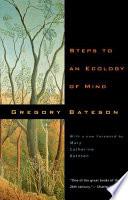Source: Steps to an Ecology of Mind (1972), p. 486
Quotes from book
Steps to an Ecology of Mind

Steps to an Ecology of Mind is a collection of Gregory Bateson's short works over his long and varied career. Subject matter includes essays on anthropology, cybernetics, psychiatry, and epistemology. It was originally published by Chandler Publishing Company in 1972 .The book begins with a series of metalogues, which take the form of conversations with his daughter Mary Catherine Bateson. The metalogues are mostly thought exercises with titles such as "What is an Instinct" and "How Much Do You Know." In the metalogues, the playful dialectic structure itself is closely related to the subject matter of the piece.
Steps to an Ecology of Mind (1972)
Steps to an Ecology of Mind (1972)
“The playful nip denotes the bite, but it does not denote what would be denoted by the bite.”
From Part 4, section 2: A Theory of Play and Fantasy
Steps to an Ecology of Mind (1972)
7.4 Ecology and Flexibility in Urban Civilization
Steps to an Ecology of Mind (1972)
Source: Steps to an Ecology of Mind (1972), p. 494
Gregory Bateson (1935) "Culture Contact and Schismogenesis" in: Man, Vol. 35 (Dec., 1935), pp. 178-183. Republished in: Steps to an Ecology of Mind (1972, p. 75)
Source: Steps to an Ecology of Mind (1972), p. 143, as cited in: Lawrence S. Bale (1992) " Gregory Bateson’s Theory of Mind: Practical Applications to Pedagogy http://www.narberthpa.com/Bale/lsbale_dop/gbtom_patp.pdf". November 1992. p. 20
Source: Steps to an Ecology of Mind (1972), p. 459, Chapter " Form, Substance and Difference http://www.rawpaint.com/library/bateson/formsubstancedifference.html#Anchor-39583"
From Part 4, section 2: A Theory of Play and Fantasy
Steps to an Ecology of Mind (1972)
Source: Steps to an Ecology of Mind (1972), p. 494
Source: Steps to an Ecology of Mind (1972), p. 336
“. A tertiary negative injunction prohibiting the victim from escaping from the field.”
Source: Steps to an Ecology of Mind (1972), p. 206-207 as cited in: S.P. Arpaia (2011) " Paradoxes, circularity and learning processes http://www2.units.it/episteme/L&PS_Vol9No1/L&PS_Vol9No1_2011_18b_Arpaia.pdf". In: L&PS – Logic & Philosophy of Science, Vol. IX, No. 1, 2011, pp. 209
“We are most of us governed by epistemologies that we know to be wrong”
Source: Steps to an Ecology of Mind (1972), p. 461
Steps to an Ecology of Mind (1972)
Steps to an Ecology of Mind (1972)